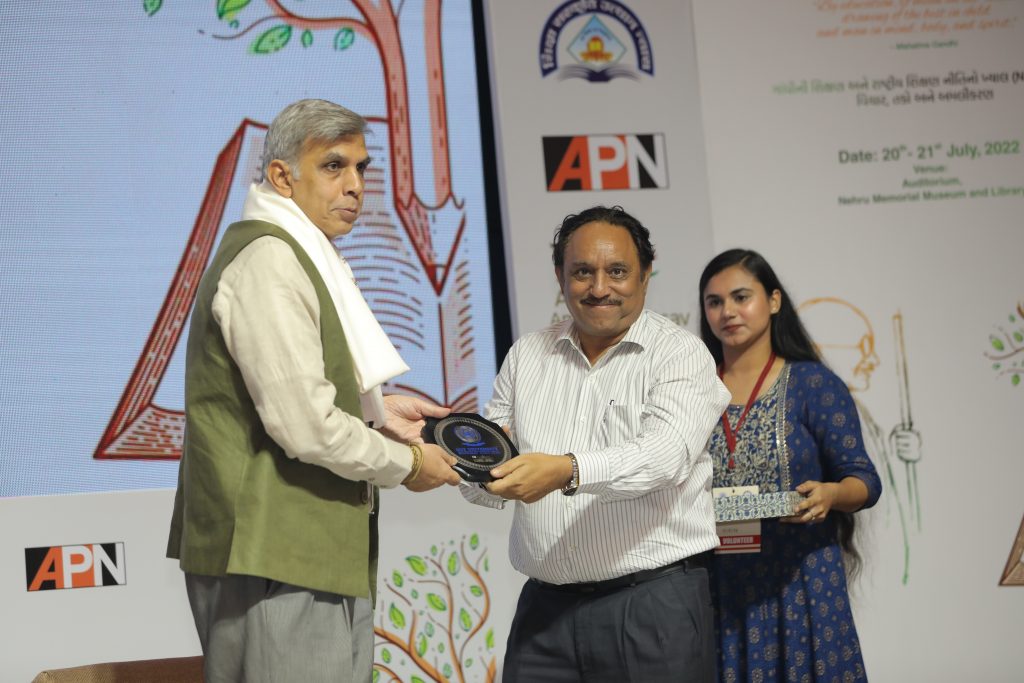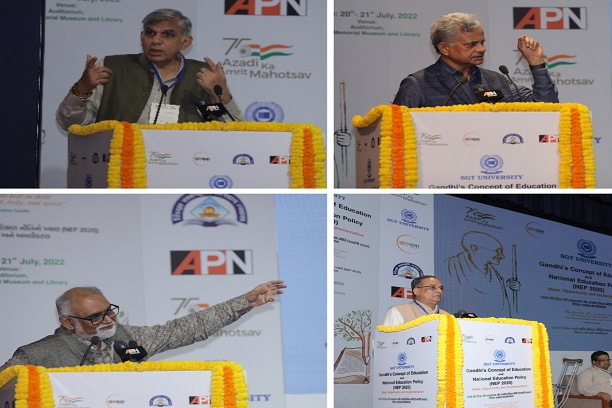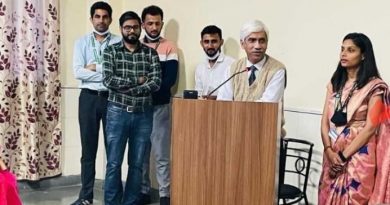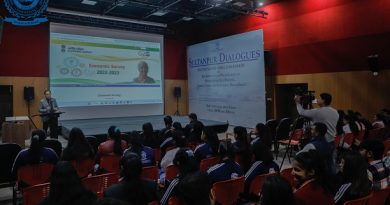International Conference on “Gandhi’s Concept of Education and National Education Policy 2020: Idea, Opportunity and Implementation” begins at Teen Murti Bhawan
SGT Times Reporter
New Delhi, July 27
A two-day International Conference on “Gandhi’s Concept of Education and National Education Policy 2020: Idea, Opportunity and Implementation” being organized by SGT University, Gurugram, in collaboration with Sanrachna and Shiksha Sanskriti Utthan Nyas, began at Nehru Memorial Museum & Library, Teen Murti Bhavan, New Delhi today.
The main speaker of the inaugural session, Prof. Dinesh Singh, former Vice Chancellor of Delhi University and presently, Director, Centre for Lateral Innovation, Creativity and Knowledge (CLICK) said that Mahatma Gandhi was always of the view that knowledge without action is meaningless. Today, the National Education Policy also says action projects must be included in the curriculum. He said the NEP tells us to keep the learning simple and not complicated.
“It is a common mentality of academicians to ask questions in examinations which even the best of students find difficult to answer. This is not the way to just a student. Teachers must come out of this testing mode,” said Prof. Singh.
Emphasizing the need for integrating various disciplines of education for the all-around development of students, Prof. Singh said the National Education Policy lays stress on this.
He, however, said that teachers have an incorrect outlook towards interdisciplinary and multidisciplinary education.
“Interdisciplinary doesn’t mean you include a few chapters of Geography in Mathematics or vice versa. We should rather find what Geography is there in Mathematics and what Mathematics is there is in Geography.”
He said as VC of Delhi University he started the practice of spinning Charkha. Students could go to the Charkha room and spin it.
“One day a girl student came to me and told me that she had gone into depression, but the spinning of Charkha helped her in coming out of the malaise,” he said.
Prof. Sachchidanand Joshi said that our education system doesn’t provide skills to the students. An electrical engineer doesn’t know how to fix a fuse. Students just swallow various chapters in the night and vomit it all on their answer sheets in the morning. He said even the teachers evaluating answer sheets assign marks as per their mood.
Prof. Joshi, Executive and Academic Head of Indira Gandhi National Centre for the Arts (IGNCA), said that in ancient times education was a part of the culture, but today, we express the satisfaction that now, culture will be taught in education. Culture doesn’t mean a painting of a dance performance. Culture means having pride in one’s nation and cultural heritage. The NEP provides us all this, he added.
Emphasizing the importance of teachers, Prof. Joshi said that the teachers’ role was as important as that of soldiers guarding the nation’s boundaries. “If a soldier falters in his duty it can put the nation’s security at risk, but if a teacher fails to perform his or her duty, the nation’s youth will become directionless,” said Prof. Joshi.
He said it is high time that the best students should go into teaching. But unfortunately, all good students like to go to applied areas.
Mr. Amogh Rai, Executive Director, Sanrachna Foundation, said that he did a lot of research on what Mahatma Gandhi thought of education and he found that it took 70 years for the nation to bring Gandhi’s ideas of education into practice through the NEP.
He said that while reading about the Father of the Nation, he realized that Gandhi was the real Tinkerer. He possessed in-depth knowledge about education not only in India but abroad and understood the importance of hands-on experience. Gandhi realized that the Charkha design was not appropriate and this needed some innovations. Hence, he announced an open challenge to design an improved charkha in 1920 with an award of Rs.5000. For Gandhi, spinning wheel symbolizes self-sufficiency. “NEP is a statement of the effect of initiatives and concepts on education” was taken by Mahatma Gandhi.
The Managing Trustee of SGT University Mr. Manmohan Singh Chawla felicitated Prof. Dinesh Singh and Prof. Sachchidanand Joshi.
Earlier, initiating the day’s proceedings, Prof. Rakesh Kumar Sharma, Pro-Chancellor, SGT University, gave details of the various initiatives taken by the university, including Atal Innovation Centre and CLICK.
Prof. Vinod Kumar and Prof. Vikas Dhawan, both Pro Vice-Chancellors of SGT University and Prof. Sumer Singh, Advisor of the University, initiated the three academic sessions of the day.
Col. Partha Pratim Dubey, Prof. Anand Prakash, Prof. Seema Bawa, Prof, Santosh Rai, Prof. Pawan Sharma, Dr. Veerendra Mishra, Prof. Madan Mohan Chaturvedi, Prof. Shobha Bagai, Prof. Jyoti Sharma, Prof. Jawahar Lal Kaul, Prof. CB Sharma and Prof. Pushpesh Pant also expressed their views.




